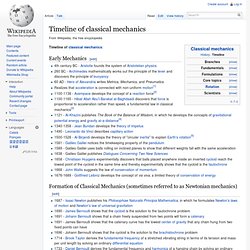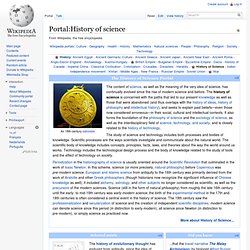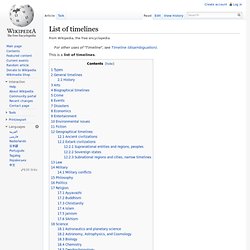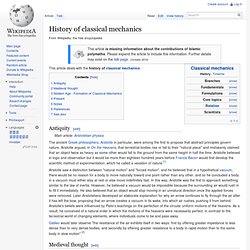

Timeline of classical mechanics. Timeline of classical mechanics: Early Mechanics[edit] Formation of Classical Mechanics (sometimes referred to as Newtonian mechanics)[edit] References[edit]

Portal:History of science. Edit The History of Science Portal The content of science, as well as the meaning of the very idea of science, has continually evolved since the rise of modern science and before.

The history of science is concerned with the paths that led to our present knowledge as well as those that were abandoned (and thus overlaps with the history of ideas, history of philosophy and intellectual history), and seeks to explain past beliefs—even those now considered erroneous—in their social, cultural and intellectual contexts. It also forms the foundation of the philosophy of science and the sociology of science, as well as the interdisciplinary field of science, technology, and society, and is closely related to the history of technology.
The study of science and technology includes both processes and bodies of knowledge. Periodization in the historiography of science is usually oriented around the Scientific Revolution that culminated in the work of Isaac Newton. ...Archive edit Selected anniversaries. List of timelines. This is a list of timelines.

Types[edit] General timelines[edit] History of classical mechanics. This article deals with the history of classical mechanics.

Antiquity[edit] The ancient Greek philosophers, Aristotle in particular, were among the first to propose that abstract principles govern nature. Aristotle argued, in On the Heavens, that terrestrial bodies rise or fall to their "natural place" and mistakenly claimed that an object twice as heavy as some other would fall to the ground from the same height in half the time. Aristotle believed in logic and observation but it would be more than eighteen hundred years before Francis Bacon would first develop the scientific method of experimentation, which he called a vexation of nature.[1] Aristotle saw a distinction between "natural motion" and "forced motion", and he believed that in a hypothetical vacuum, there would be no reason for a body to move naturally toward one point rather than any other, and so he concluded a body in a vacuum must either stay at rest or else move indefinitely fast.
Medieval thought[edit] Present[edit]